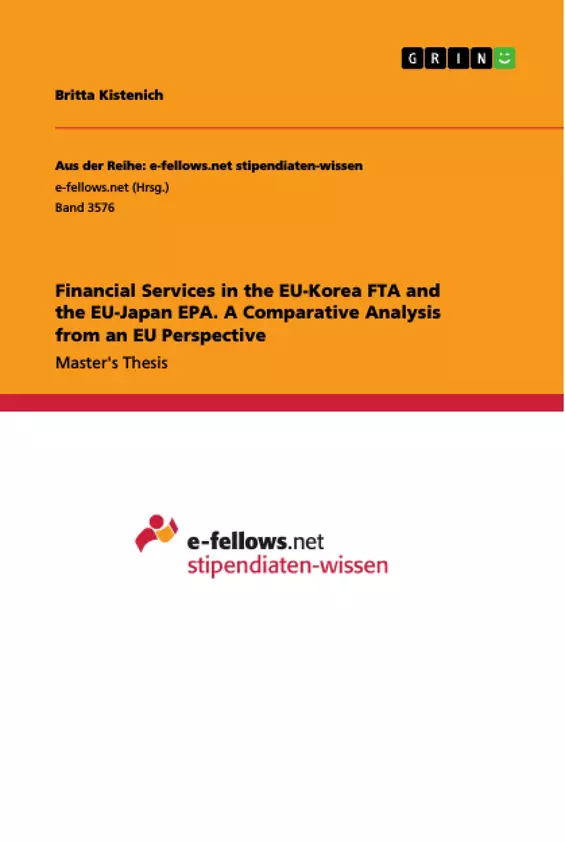This research aims to find out whether there exist any differences between financial services provisions and commitments in the EU-Korea FTA and EU-Japan EPA.
Through a qualitative analysis in form of a comparison between the agreement texts, it was found that there exists a number of differences which can be grouped in three categories: (1) architecture, scope and coverage, (2) modes of supply, and (3) regulatory framework. The most significant differences can be found in the third category. In general, JEFTA was found out to be more liberal in many respects, because it has a broader coverage, clarifications which do not exist in KOREU and contains provisions on regulatory cooperation, among others.
This research identifies the different EU interest in Korea’s and Japan’s financial services sector as the most probable reason for the differences in the agreements. It is concluded that Japan’s financial services sector was more attractive for the EU at the time when negotiations were initiated. This is due to the fact that first, Japan’s banking sector is more developed and second, Japan is more involved in international trade and investment in financial services. Based on the findings, the EU and Korea should work to amend the agreement to improve the efficiency in financial services trade. Furthermore, the EU has to make sure to establish a balance of liberalization and financial stability.
Inhaltsverzeichnis (Table of Contents)
- Introduction
- Literature Review
- Financial Services in RTAS
- Financial Services in International Trade
- Financial Services in EU Trade Agreements
- Overview of KOREU and JEFTA
- The EU-Korea Free Trade Agreement (KOREU)
- The EU-Japan Economic Partnership Agreement (JEFTA)
- Financial Services in KOREU and JEFTA
- Comparative Analysis of Financial Services in KOREU and JEFTA
- Architecture, Scope and Coverage
- The Modes of Supply
- Regulatory Framework
- Reasons for the Differences
- Development of the Financial Sector
- Involvement in Trade in Financial Services
- Comparative Analysis of Financial Services in KOREU and JEFTA
- Policy Recommendations
Zielsetzung und Themenschwerpunkte (Objectives and Key Themes)
This research aims to analyze the differences in financial services provisions and commitments between the EU-Korea Free Trade Agreement (KOREU) and the EU-Japan Economic Partnership Agreement (JEFTA). The research utilizes a comparative analysis of the agreement texts to identify key differences and their implications for the EU’s trade policy in financial services.
- Comparison of financial services provisions in KOREU and JEFTA
- Analysis of differences in the agreements' architecture, scope, coverage, modes of supply, and regulatory frameworks
- Exploration of reasons for the observed differences, focusing on the EU's interest in Korea's and Japan's financial services sectors
- Evaluation of the EU's approach to financial services liberalization and the importance of balancing liberalization with financial stability
- Recommendations for improving the efficiency of financial services trade between the EU and Korea
Zusammenfassung der Kapitel (Chapter Summaries)
- Introduction: Provides an overview of the research topic, outlining the objectives and research questions.
- Literature Review: Examines existing research on international trade in financial services, focusing on relevant frameworks and previous analyses of free trade agreements (FTAs).
- Financial Services in RTAS: Explores the role of financial services in international trade agreements (RTAS) and analyzes their significance in the context of the EU’s trade policy.
- Overview of KOREU and JEFTA: Presents a detailed description of the EU-Korea Free Trade Agreement (KOREU) and the EU-Japan Economic Partnership Agreement (JEFTA), highlighting key provisions related to financial services.
- Financial Services in KOREU and JEFTA: Conducts a comparative analysis of financial services provisions in KOREU and JEFTA, focusing on architecture, scope, modes of supply, and regulatory frameworks. This section explores significant differences between the two agreements, providing insights into the EU's approach to financial services liberalization in different contexts.
- Reasons for the Differences: Examines the factors contributing to the observed differences between KOREU and JEFTA. The analysis explores the EU's varying interests in Korea's and Japan's financial services sectors, focusing on the development of their financial sectors and their involvement in international trade in financial services.
- Policy Recommendations: Formulates recommendations for improving the efficiency of financial services trade between the EU and Korea. The chapter suggests potential amendments to KOREU to enhance its effectiveness and addresses the importance of maintaining a balance between liberalization and financial stability.
Schlüsselwörter (Keywords)
The key terms and concepts explored in this research include: international trade, financial services, EU trade policy, free trade agreements (FTAs), EU-Korea Free Trade Agreement (KOREU), EU-Japan Economic Partnership Agreement (JEFTA), trade in services, financial liberalization, regulatory frameworks, financial stability, and comparative analysis. These keywords highlight the focus of the research on understanding the differences in financial services provisions between KOREU and JEFTA and analyzing the implications for the EU's trade policy in this sector.
- Citation du texte
- Britta Kistenich (Auteur), 2019, Financial Services in the EU-Korea FTA and the EU-Japan EPA. A Comparative Analysis from an EU Perspective, Munich, GRIN Verlag, https://www.grin.com/document/934609



